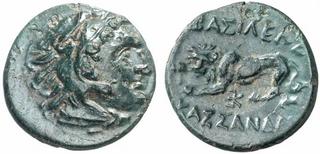Related Research Articles
This article concerns the period 319 BC – 310 BC.

This article concerns the period 309 BC – 300 BC.
During the 290s BC, Hellenistic civilization begins its emergence throughout the successor states of the former Argead Macedonian Empire of Alexander the Great, resulting in the diffusion of Greek culture throughout the Levant and advances in science, mathematics, philosophy, etc. Meanwhile, the Roman Republic is embroiled in war against the Samnites, the Mauryan Empire continues to thrive in Ancient India, and the Kingdom of Qin in Ancient China, the one which in the future will conquer its adversaries and unite China, begins to emerge as a significant power during the Warring States period.
Year 312 BC was a year of the pre-Julian Roman calendar. At the time, it was known as the Year of the Consulship of Corvus and Mus. The denomination 312 BC for this year has been used since the early medieval period, when the Anno Domini calendar era became the prevalent method in Europe for naming years.
Year 315 BC was a year of the pre-Julian Roman calendar. At the time, it was known as the Year of the Consulship of Cursor and Philo. The denomination 315 BC for this year has been used since the early medieval period, when the Anno Domini calendar era became the prevalent method in Europe for naming years.
Year 316 BC was a year of the pre-Julian Roman calendar. At the time, it was known as the Year of the Consulship of Rutilus and Laenas. The denomination 316 BC for this year has been used since the early medieval period, when the Anno Domini calendar era became the prevalent method in Europe for naming years.
Year 313 BC was a year of the pre-Julian Roman calendar. At the time, it was known as the Year of the Consulship of Cursor and Brutus. The denomination 313 BC for this year has been used since the early medieval period, when the Anno Domini calendar era became the prevalent method in Europe for naming years.
Year 311 BC was a year of the pre-Julian Roman calendar. At the time, it was known as the Year of the Consulship of Brutus and Barbula. The denomination 311 BC for this year has been used since the early medieval period, when the Anno Domini calendar era became the prevalent method in Europe for naming years.

Seleucus I Nicator was a Macedonian Greek general, officer and successor of Alexander the Great who went on to found the eponymous Seleucid Empire, led by the Seleucid dynasty. Initially a secondary player in the power struggles following Alexander's death, Seleucus rose to become the total ruler of Asia Minor, Syria, Mesopotamia, and the Iranian plateau, assuming the title of basileus (king). The Seleucid Empire was one of the major powers of the Hellenistic world, until it was overcome by the Roman Republic and Parthian Empire in the late second and early first centuries BC.

Antigonus I Monophthalmus was a Macedonian Greek general and successor of Alexander the Great. A prominent military leader in Alexander's army, he went on to control large parts of Alexander's former empire. He assumed the title of basileus (king) in 306 BC and reigned until his death. He was the founder of the Antigonid dynasty, which ruled over Macedonia until its conquest by the Roman Republic in 168 BC.

Cassander was king of the Ancient Greek kingdom of Macedonia from 305 BC until 297 BC, and de facto ruler of southern Greece from 317 BC until his death.

The Battle of Ipsus was fought between some of the Diadochi in 301 BC near the town of Ipsus in Phrygia. Antigonus I Monophthalmus, the Macedonian ruler of large parts of Asia, and his son Demetrius were pitted against the coalition of three other successors of Alexander: Cassander, ruler of Macedon; Lysimachus, ruler of Thrace; and Seleucus I Nicator, ruler of Babylonia and Persia. Only one of these leaders, Lysimachus, had actually been one of Alexander's somatophylakes.

The Wars of the Diadochi or Wars of Alexander's Successors were a series of conflicts fought between the generals of Alexander the Great, known as the Diadochi, over who would rule his empire following his death. The fighting occurred between 322 and 281 BC.

Eumenes was a Greek general and satrap. He participated in the Wars of Alexander the Great, serving as both Alexander's personal secretary and as a battlefield commander. He later was a participant in the Wars of the Diadochi as a supporter of the Macedonian Argead royal house. He was executed after the Battle of Gabiene in the winter of 316–315 BC.
Peithon or Pithon was the son of Crateuas, a nobleman from Eordaia in western Macedonia. He was famous for being one of the bodyguards of Alexander the Great, becoming the later satrap of Media, and claiming to be one of the diadochi.
Ptolemaeus or Ptolemy was a nephew and general of Antigonus I Monophthalmus, one of the Successors of Alexander the Great. His father was also called Ptolemy and was a brother of Antigonus. Ptolemy, the nephew, was Antigonus's right-hand-man until his son Demetrius took on a more prominent role.
Alexander was a son of Polyperchon, the regent of Macedonia, and an important general in the Wars of the Diadochi.
Aristodemus of Miletus was one of the oldest and most trusted friends of Antigonus Monophthalmus. He is described by Plutarch as an arch-flatterer of Antigonus. Antigonus frequently used him on important diplomatic missions and occasionally entrusted him with military commands as well.
Prepelaus was a Macedonian officer in the service of Cassander.
The Second War of the Diadochi was the conflict between the coalition of Polyperchon, Olympias and Eumenes and the coalition of Cassander, Antigonus, Ptolemy and Lysimachus following the death of Cassander's father, Antipater.